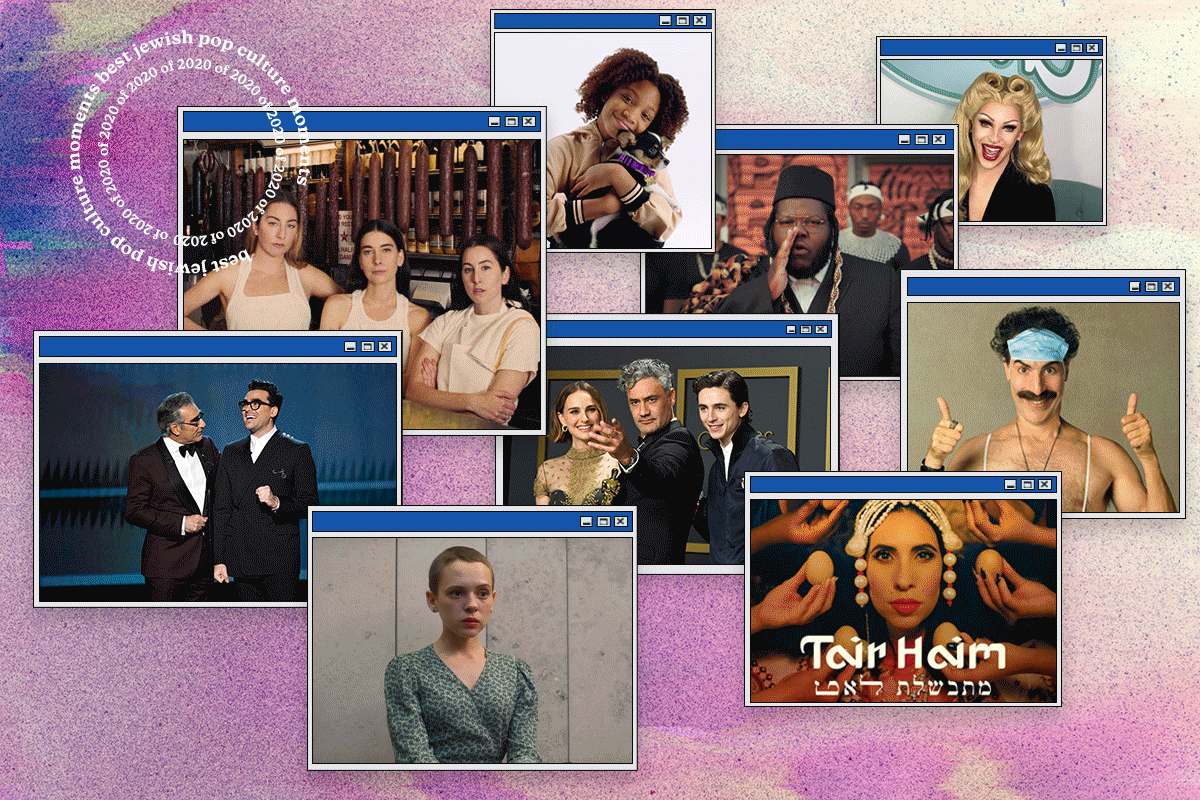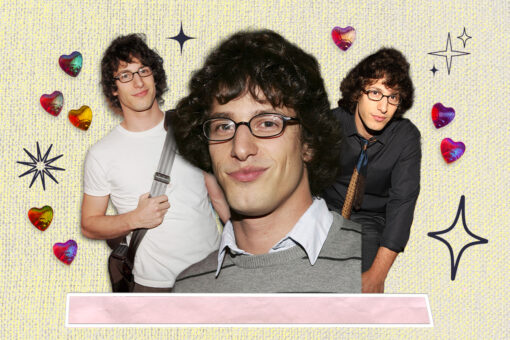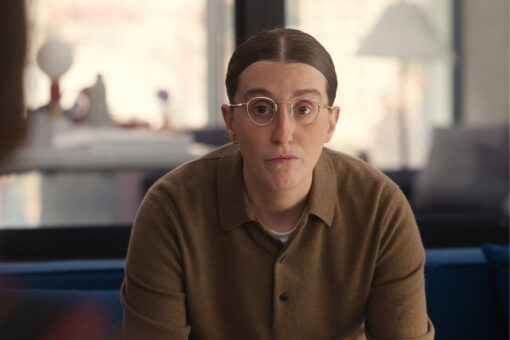Well, 2020 was not an easy year. But we’re here to celebrate the end of it. And in this year of awfulness, Jewish celebrities still managed to bring us moments of joy, representation, celebration, and escape.
There were some extremely Jewish moments in TV, with shows like Unorthodox, Never Have I Ever, Big Mouth, The Plot Against America, Hunters, and more that graced our screens. Plus, though theaters were largely shut down this year, we got some notable Jewish movies to stream, including An American Pickle, Borat Subsequent Moviefilm, Beastie Boys Story, and more. And, we can’t forget the Jewish music of 2020: From Haim to Nissim Black to Eden Alene to Adam Melchor, Jewish musicians shined bright.
This list will take you through the best Jewish pop culture moments of the year, counting down to #1 — all completely and utterly subjective, of course. From Argentine Jewish tennis player Diego Schwartzman’s stand-out clay court season to Tair Haim’s debut single spotlighting Yemeni Jewish culture to several instances of Daveed Diggs being great, Jews had quite the year in pop culture.
So, without further ado, it’s time for Alma’s fourth annual best Jewish pop culture moments. Happy end of 2020, y’all. We made it.
50. Ethan Zohn returned to Survivor. In the premiere of the Winners of War season of the classic reality show, Zohn said, “I remember dreaming and praying that I’d be alive long enough to play Survivor again, and so it’s a miracle that I’m sitting here today.” After winning Survivor: Africa in 2001 at age 27, the Jewish contestant used part of his $1 million prize to start the nonprofit Grassroot Soccer. Eight years later, in 2009, Zohn was diagnosed with CD20-positive Hodgkin’s lymphoma and underwent chemotherapy and a stem-cell transplant. He is still in recovery — so watching him compete in the grueling reality competition was truly remarkable.
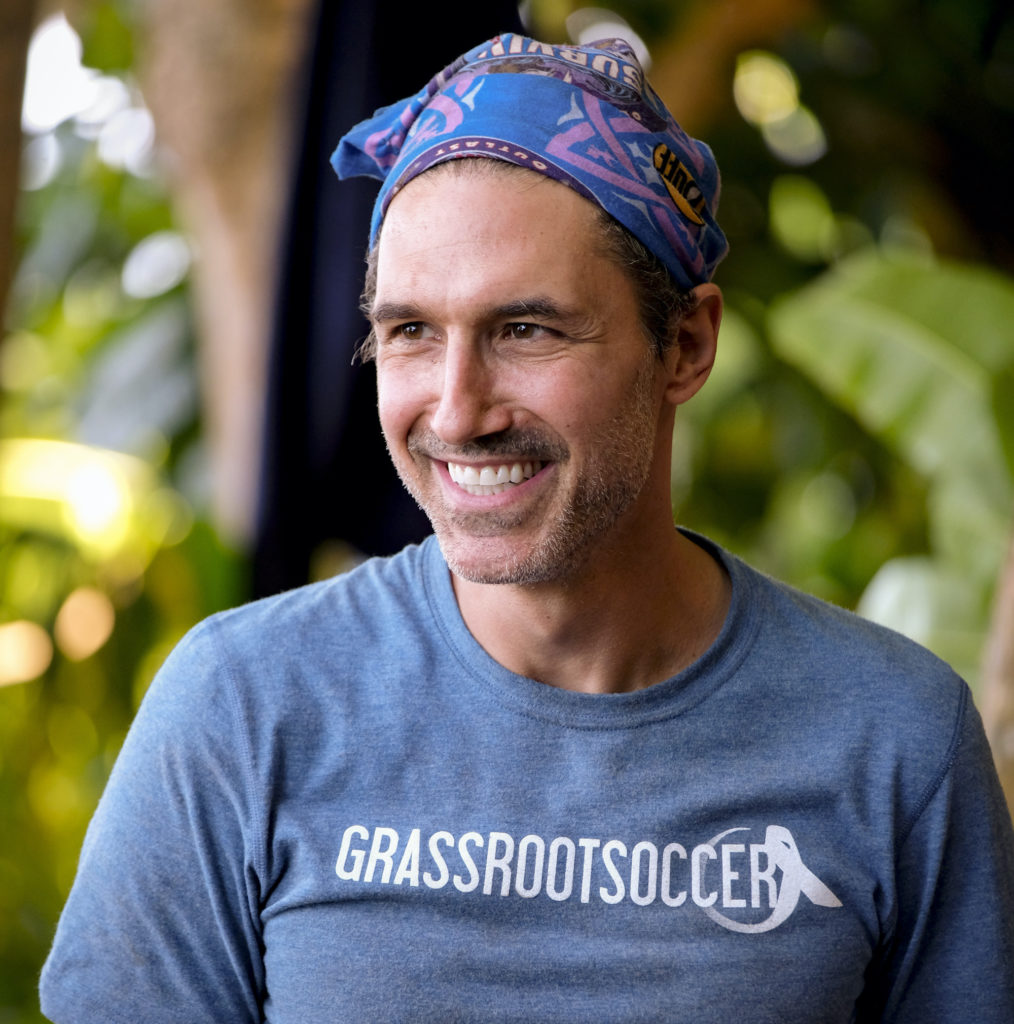
49. The Plot Against America aired on HBO this spring, adapted from the Philip Roth book of the same name. The series focuses on a family in a tight-knit Jewish community in New Jersey and is a very Jewish show, highlighting the dangers of antisemitism.
48. Jewish model, actress, and activist Emily Ratajkowski penned a powerful essay for The Cut: “When does a model own her own image?” Writing beautifully and cunningly about her experience of sexual assault and the need for ownership over her own image, Emrata made us proud to call her one of our own.
47. In a year when sports shut down, then kinda returned in bubble forms, watching Jewish superstars Sue Bird and Alysha Clark lead the Seattle Storm to victory in the Wubble (WNBA bubble) was a treat.
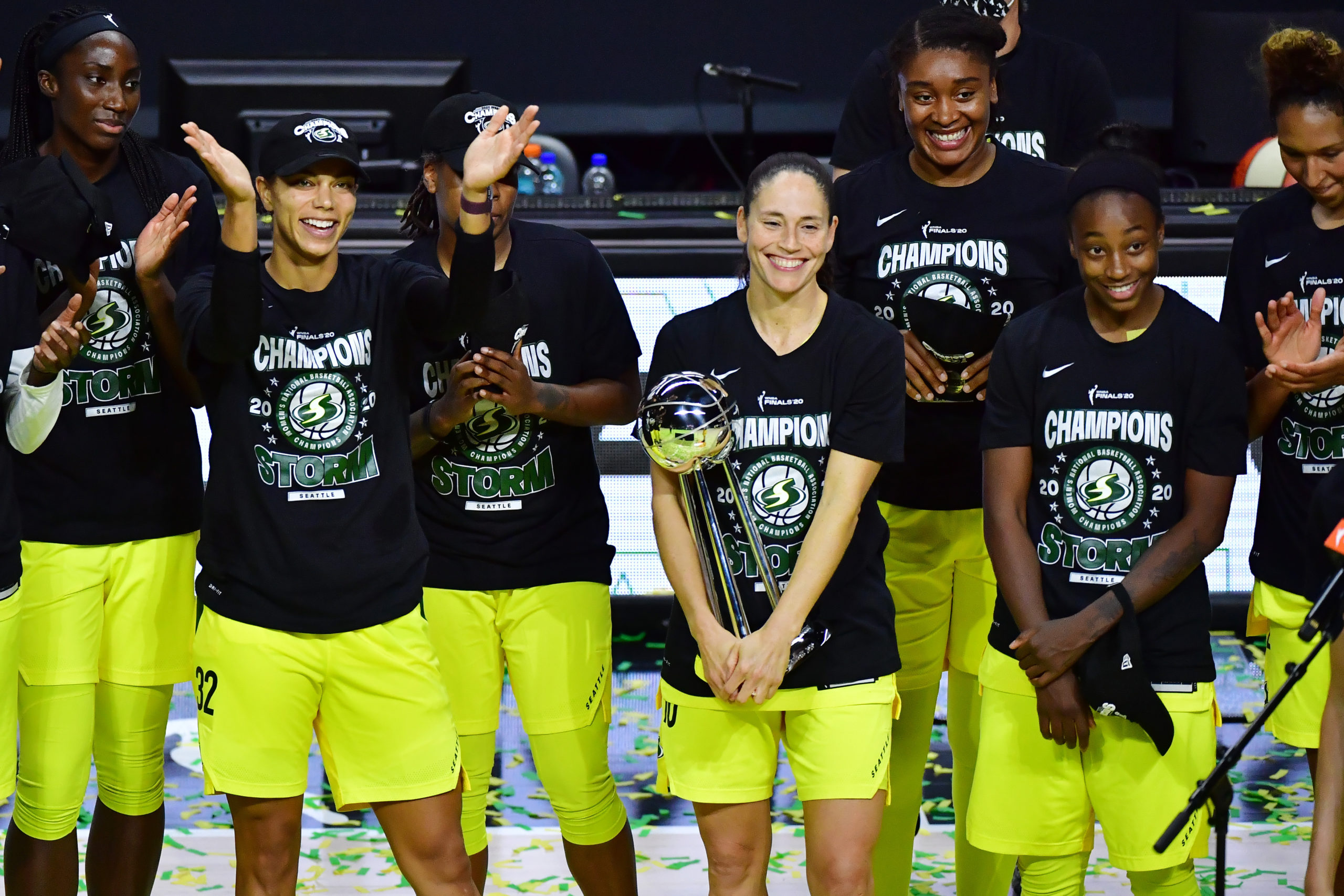
Plus, this was Bird’s 17th season in the WNBA, and she earned her fourth WNBA title. “I’m 39 years old, I’m not what I was physically when I was 21,” Bird told the Athletic during the finals. “I feel like younger players now when they play against me, they probably think this is always how I’ve been, but there was a faster version. A faster, quicker version did exist. But she wasn’t as smart.”
46. In what feels like a lifetime ago, Bernie Sanders was running to be the Democratic nominee for president. In a funny coincidence, the Jewish senator from Vermont was scheduled to appear on the Today show on the same morning as Larry David, the Jewish comedian who famously impersonates Bernie on Saturday Night Live. Their interaction was a true delight, making Bernie and Larry appearing together a notable Jewish pop culture moment of 2020.
What are the odds! Both @BernieSanders and Larry David are with us on the same morning. pic.twitter.com/eJFuwIeYSi
— TODAY (@TODAYshow) January 10, 2020
45. Another lifetime ago, we had awards shows. The Independent Spirit Awards (which happen the night before the Oscars) gave a whole lotta love for the very Jewy Uncut Gems. And the cherry on top of the accolades for the Safdie brothers’ film? Adam Sandler’s acceptance speech for Best Male Lead. Seriously, watch it:
While the Oscars may have snubbed Adam, the Almas (our very own awards) awarded him Breakout Actor. And yes, a man can break out at age 53 after already starring in over 50 movies. Deal with it.
44. While we’re talking about the Oscars, we need to talk about Jewish actress Tracee Ellis Ross’s afterparty look, which was simply stunning.
She was basically an Oscar award!!!
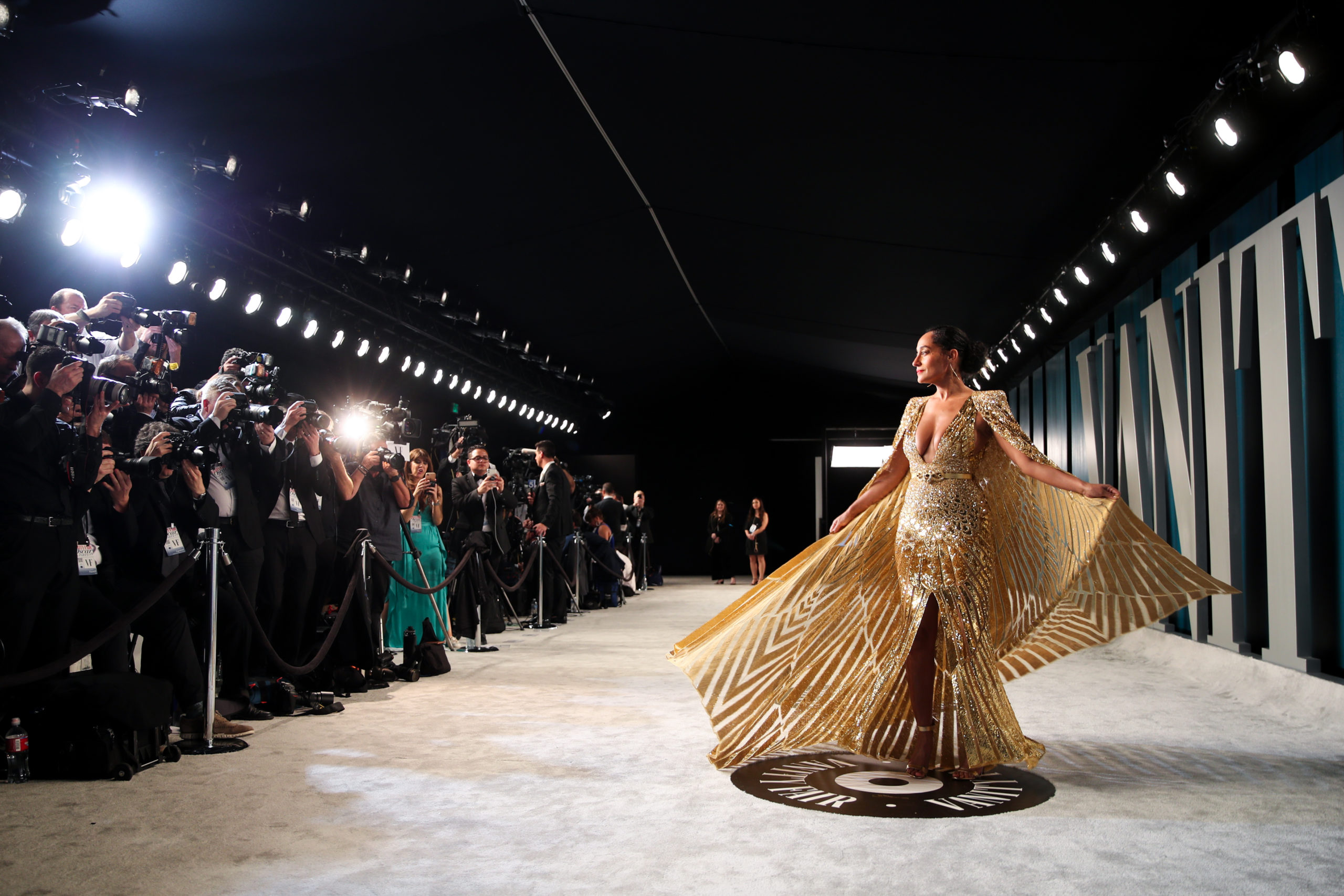
Yes, this counts as a Moment.
43. Jewish novelist Walter Mosley was honored with the National Book Foundation’s lifetime achievement award this November. Mosley, 68, became the first Black man to win the medal in its history. In his acceptance speech, he spoke on the nature of being the “first,” and referenced the 1970 record by Curtis Mayfield, “We the People Who Are Darker Than Blue”:
He ended his speech with the following:
There’s a great weight hanging over the reception of an award when the underlying subject is, the first Black man to receive… We the people who are darker than blue, we have been here, on this continent, in this storm for 400 years. As a matter of course we have been chained, beaten, raped, murdered, robbed of our names, our history and often even of our dignity. This has been an ongoing process, an unending anguish.
And so one might be cowed by the monumental negative space surrounding that pinprick of light that this award represents. One might ask can such a thing make a difference?
Is this a dying gasp or a first breath? Is today different from any other day over the past 400 years? I prefer to believe that we are on the threshold of a new day, that this evening is but one of ten thousand steps being taken to recognize the potential of this nation. We, the people who are darker than blue, built this nation brick by brick. We crafted its jazz and bled for its yet to be realized beliefs. These achievements cannot be ignored. We’ve been here from the beginning and we’ll be there at the end, our heads held high when the promise of equality is achieved.
A well-deserved award for the prolific mystery author.
42. We all went a little bananas during the early weeks of the pandemic. One Jewish celebrity who leaned into the madness of lockdown? Taika Waititi let his daughters cut his hair on Instagram live. “I’m definitely staying inside the rest of the year,” Taika joked.
41. Another notable Instagram live haircut was when Sue Bird cut her girlfriend Megan Rapinoe’s hair. While that was a delight, this pop culture moment is actually going to the moment when Bird and Rapinoe announced their engagement. In October, in a caption-less Instagram post, the Israeli-American basketball player posted a picture of the American soccer star putting a ring on her finger. We felt joy again.
40. Rabbi Delphine Horvilleur graced the January cover of Elle France. Rabbi Delphine is a spiritual leader, public intellectual, mother of three, avowed feminist, and her cover was simply amazing. (Read highlights (in English) from her profile here.)
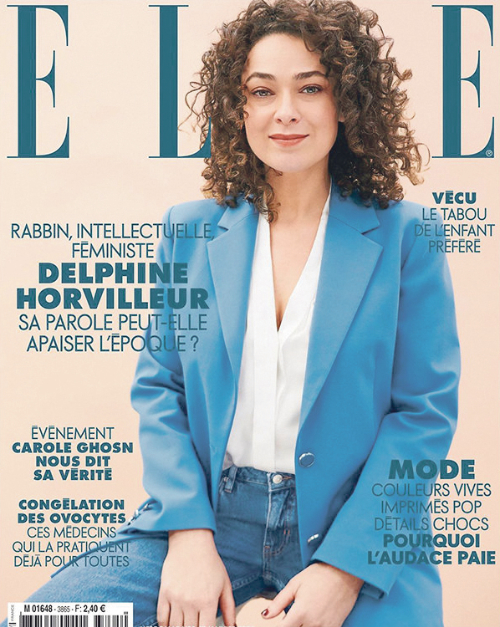
39. While the annual Eurovision song contest was cancelled this year in light of the pandemic, Netflix released a Will Ferrell and Rachel McAdams film, Eurovision Song Contest: The Story of Fire Saga, that paid loving tribute to the zany contest. Making a guest appearance? Israeli pop star Netta, the winner of Eurovision 2018. In an interview with Alma, Netta said of her Eurovision success (and after), “It wasn’t part of my plan to be a voice for all these young little girls. I was just trying to do the most authentic, true thing that I could possibly do. And when you are trying to be the most authentic version of yourself, you accidentally inspire other people.”
38. Another movie that brought us joy this year was Beyoncé’s Black Is King on Disney+. As Erica Gerald Mason wrote in Alma, “Beyoncé’s latest musical film/visual album… takes imagery from both The Lion King and the story of Moses to create a compelling allegory about the African diaspora. As a Black Jewish woman watching the film, I was most taken with the bonds — both familial and adversarial — that Black Is King illustrates.”
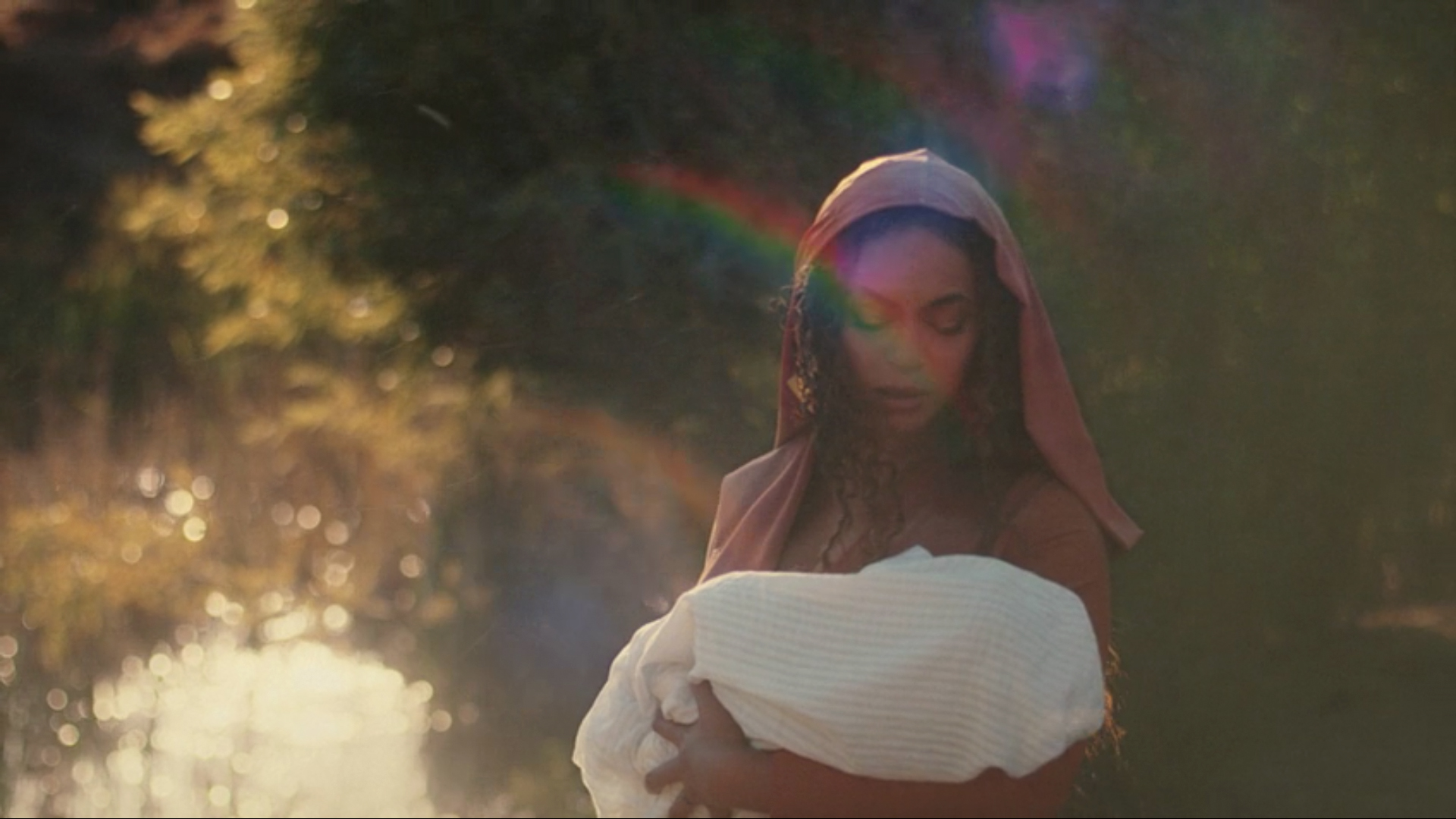
So yes, the depiction of the story of Moses in Black Is King was one of our best Jewish pop culture moments.
37. While not one explicit moment, Jewish tennis player Diego Schwartzman had a remarkable year. He made it into the French Open semifinals; at the Italian Open, he beat Rafael Nadal for the first time; and he ended the year in the top 10 rankings for the first time in his career. As I wrote in Alma at the start of the year, “Watching this Jewish player do his thing — specifically, beat guys who are over a foot taller than him — is a true joy.”
36. Jewish comedian Chloe Fineman’s impression of Timothée Chalamet is gold. One very funny Jew imitating a Jewish heartthrob? Yes, please:
35. Also on Saturday Night Live this season, Jewish actress Maya Rudolph’s impression of Kamala Harris was simply pitch perfect:
(And Kamala’s impression of her Jewish mother-in-law, while not from 2020, is an everlasting gem.)
34. SNL alum Andy Samberg’s star turn in Palm Springs was another highlight of 2020. “Today, tomorrow, yesterday, it’s all the same,” his character Nyles says near the start of the film, summing up what life feels like under quarantine. Andy himself was perfect in the film; if you weren’t in love with him already, prepare to have a crush instantaneously after watching this film.
33. And then we have singer-songwriter Adam Melchor’s EP, Summer Camp. The six songs were recorded over the course of three days and released in February; they are dreamy, folksy, and will make you want to go right back to your summer camp days (even if you didn’t have any of those).
In an interview with Alma, Adam spoke about his heritage, explaining, “My favorite Jewish tradition is Passover and my favorite Ecuadorian tradition is cumbia music. My grandma was always dancing to that.”
32. The opposite of summer camp is definitely the winter holiday season, and Leslie Odom, Jr. and Nicolette Robinson’s cover of “Ma’oz Tzur” made our hearts so happy. Black Jewish actress and singer Nicolette is the perfect compliment to her Hamilton husband on this version of the classic Hanukkah song.
“My parents were always great at empowering me to be proud of who I am,” Nicolette said. “We celebrated Christian and Jewish holidays, and I got an understanding of both sides of my background. I feel really grateful for that.”
31. While we’re here talking about Jewish music, the Spike Jonze documentary Beastie Boys Story was a true highlight of 2020. The Jewish story of the Beastie Boys shines through, and Michael Diamond (Mike D.) and Adam Horovitz (Ad-Rock), the two surviving Beastie Boys, are a fantastic on-screen presence.
30. We’re going to put the Nazi-hunting show Hunters here at #30, though there was significant debate on the merits of it. (Here’s a critique in Alma, by Jason Diamond, about why Amazon’s Hunters fails, and praise in our partner site Kveller, by Lior Zaltzman, who says the show is super Jewish and worth your time.) Whatever your feelings on the show, there’s no doubt it was a moment — and Al Pacino tried to do a Yiddish accent.
29. While we’re on the subject of Nazi plotlines on Amazon Prime TV shows (niche, we know), The Boys featured a powerful and timely Nazi storyline. (Spoiler alert, but read more here.) “I realized what a perfect metaphor this was for the exact second we’re living in,” Jewish showrunner Eric Kripke told the New York Times. “For this world, where authoritarianism and celebrity are combined and fascism is packaged through social media.”
28. In another TV show (not Nazi-related at all), Jewish actress Zoë Kravitz was dazzling in High Fidelity. As Molly Tolsky wrote in Alma, “Kravitz, the child of Lisa Bonet and Lenny Kravitz, is obviously beautiful. But in High Fidelity, she is more than the sum of her fantastic genes — she radiates charisma, likability, and relatability, all while playing a self-defined asshole. And she absolutely carries the show.”
27. Miz Cracker’s return to Drag Race, in All Stars 5, was another bright spot of the year.
Competing as a proud Jewish queen, she explained to Nylon, “Being able to show young Jewish people that it can be beautiful to be Jewish even though it’s different from other people is one of the most important parts of my drag to me. So to have a proudly Jewish queen in the top three, it means a lot — whether it’s me or somebody else.”
26. On a more somber note, another standout Jewish pop culture moment of this year was when Ethiopian Jewish superstar, model Tahounia, took to Instagram to post a scathing critique of her fellow Israeli celebrities. Tahounia called out Israeli celebs for their “Black Lives Matter hypocrisy,” writing in Hebrew:
It’s always more beautiful when the Kardashians are involved and other big names… But you forgot something really small… You live here!!! In Israel! So much grief is caused here to ‘Blacks’ as you say in your do-gooder posts that I don’t remember that one of you uploaded a black picture when we blocked the roads! When you called us hooligans! When we broke glass! When we burned tires! When we cried tearfully the name of Yosef Salamsa! Solomon Tekah! Yehuda Biadga! And so many mothers who are crying every day for their children!! Get out of the horrifying bubble you live in!
Her message references last summer, when Israeli streets were ablaze with protests. Ethiopian Jews from across the country filled the streets and blocked the roads, a lifetime of pain and discrimination spilling out after the killing of Solomon Tekah, who was shot by an off-duty cop.
25. While we’re discussing Ethiopian Jews in Israel, Eden Alene, an Ethiopian Israeli teen, made history when she became the first Ethiopian Jewish person to represent Israel in the Eurovision contest. While Eurovision 2020 was cancelled, we can’t wait to watch Eden next year.
24. Season 4 of the animated Netflix show about puberty, Big Mouth, took us to Jewish summer camp. There were lots of other Jewish moments, too — from a shiva to a Ruth Bader Ginsburg Halloween costume. Always a gem.
23. Speaking of the fourth season of Jewy shows, High Maintenance season 4 gave us a fantastic Hanukkah episode. As Molly Tolsky recapped, the season 4 finale, named “Soup,” takes place on Christmas Eve, when an impending Nor’easter (with a bomb cyclone!) cancels all flights out of New York. Stuck with his niece from Phoenix, The Guy decides to “do a little Hanukkah thing” in his apartment, complete with donuts and a makeshift menorah. Read more here about this surprisingly touching (and Jewy) episode.
22. Before lockdown, the world’s most famous boy band, BTS, visited Katz’s Deli, the iconic Jewish deli. It was a whole lot of fun:
21. Jewish actor Jake Gyllenhaal wore a tie-dye Russ & Daughter’s t-shirt and the whole internet went bananas. As we all proceeded to buy one as part of a fundraiser, Zach Schiffman wrote in Alma about his journey of purchasing — and waiting for — the internet’s most coveted article of clothing.
20. While we’re talking New York Jewish food, Seth Rogen’s film An American Pickle was a well-told story of the struggle of secular American Jews.
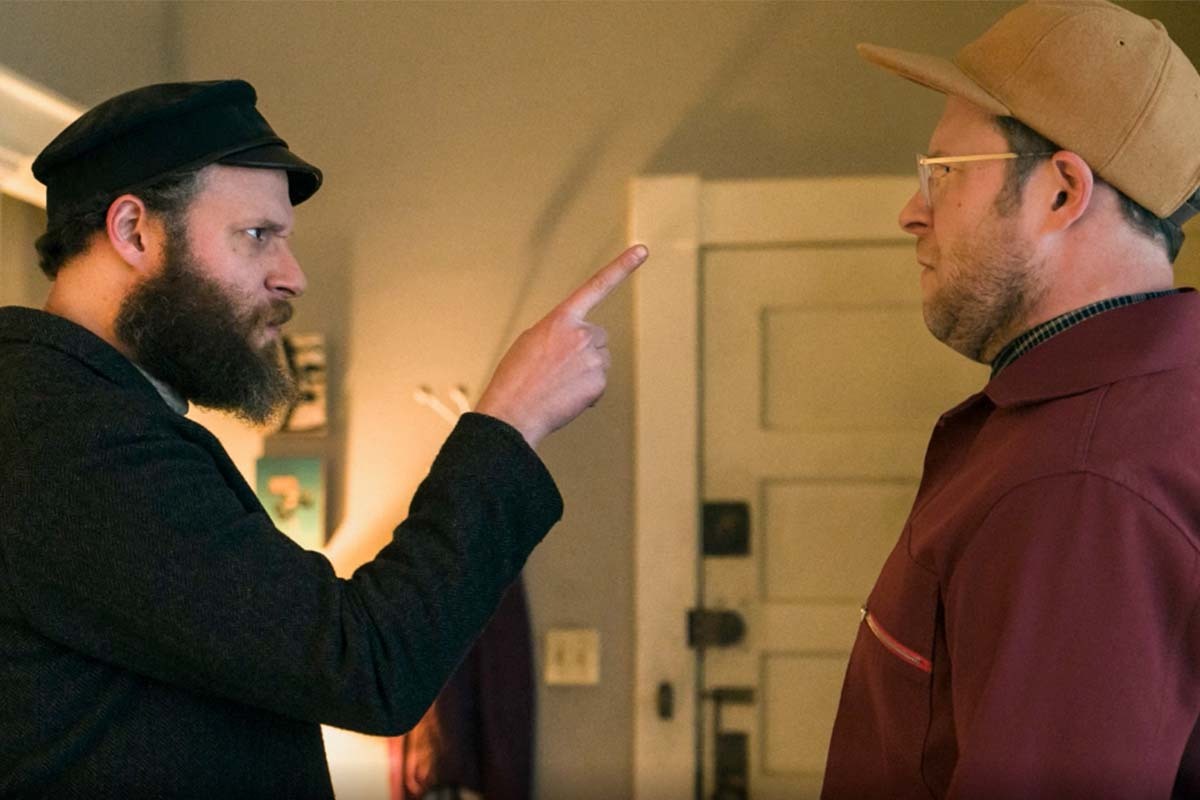
As Molly Tolsky wrote, “The pickle at the heart of An American Pickle (I’m sorry, you know I had to) is not how two men from wildly different generations and upbringings can get along, but how one Jewish American can reconcile his personal beliefs and preferences with the long-standing traditions that have shaped his family. It’s something that American Jews and other Jews in the diaspora have been grappling with for 100 years, and I’d hazard a guess it’s something we’ll continue to grapple with for 100 more. As they say, l‘dor v’dor.”
19. Back when we could still go to see movies in theaters (sad), Jewish actress Jurnee Smollett had a breakout role in Birds of Prey as superhero Black Canary. Her appearance marked the first time Black Canary was portrayed by a Black woman, and she was unbelievably good; she trained for over five months for the role, and it’s her first time publicly singing. (She’s also a very good singer, no surprise there.)
Jurnee also starred in the HBO series Lovecraft Country as Leti. It was Jurnee’s year, tbh!!
18. Eric Andre’s debut stand-up special Legalize Everything came out this year; it was very funny, and very Jewish.

Here are the best Jewish jokes from the Black Jewish comedian’s special.
17. Speaking of funny Jews, Rachel Bloom’s debut memoir I Want to Be Where the Normal People Are came out this year — and it is heartfelt, funny, and very Jewy. There are so many amazing passages, like her description of her family: “I grew up in the type of Jewish household in which I didn’t know a word of Hebrew, but I knew EVERY celebrity that had ever said anything anti-Semitic. Our Shabbat prayer was basically, ‘Baruch Atah Adonoi, Jesse Jackson, Vanessa Redgrave, Marlon Brando said “kike” once.’” Read more here.
16. Alright, this is a two-for-one: Jewish musicians covering Jewish prayers. We couldn’t resist:
Singer-songwriter Alex Blue’s cover of “Shalom Rav” is gorgeous (and will soothe your anxiety):
And the Platt Brothers covered “Ahavat Olam”:
And“Hodu”:
There’s just something so special about popular Jewish singers singing Hebrew prayers. We can’t explain how much it means to us!!
15. Jewish musician Doja Cat (Amalaratna Zandile Dlamini) had a year, largely thanks to her music going viral on TikTok. We’re going to specifically highlight her Grammy noms for this #15 slot: best new artist, record of the year, and best solo pop performance.
Also, she’s had some amazing award show performances this year, so we cannot wait for the 2021 Grammys.
https://www.youtube.com/watch?v=9dEVHuVuDSc&ab_channel=dojacatVEVO
14. In April, Never Have I Ever dropped on Netflix, and it quickly became the show everyone was obsessed with. While the show focuses on Indian American teen Devi, Yemeni Jewish writer Ayelet Tsabari wrote for Alma that “watching Devi Vishwakumar was like watching myself as a teen. Devi is the heroine I wish I had back then: a brown, nerdy, angry teenager who had just lost her dad (and is dying to have sex, and has too much hair on her arms).”
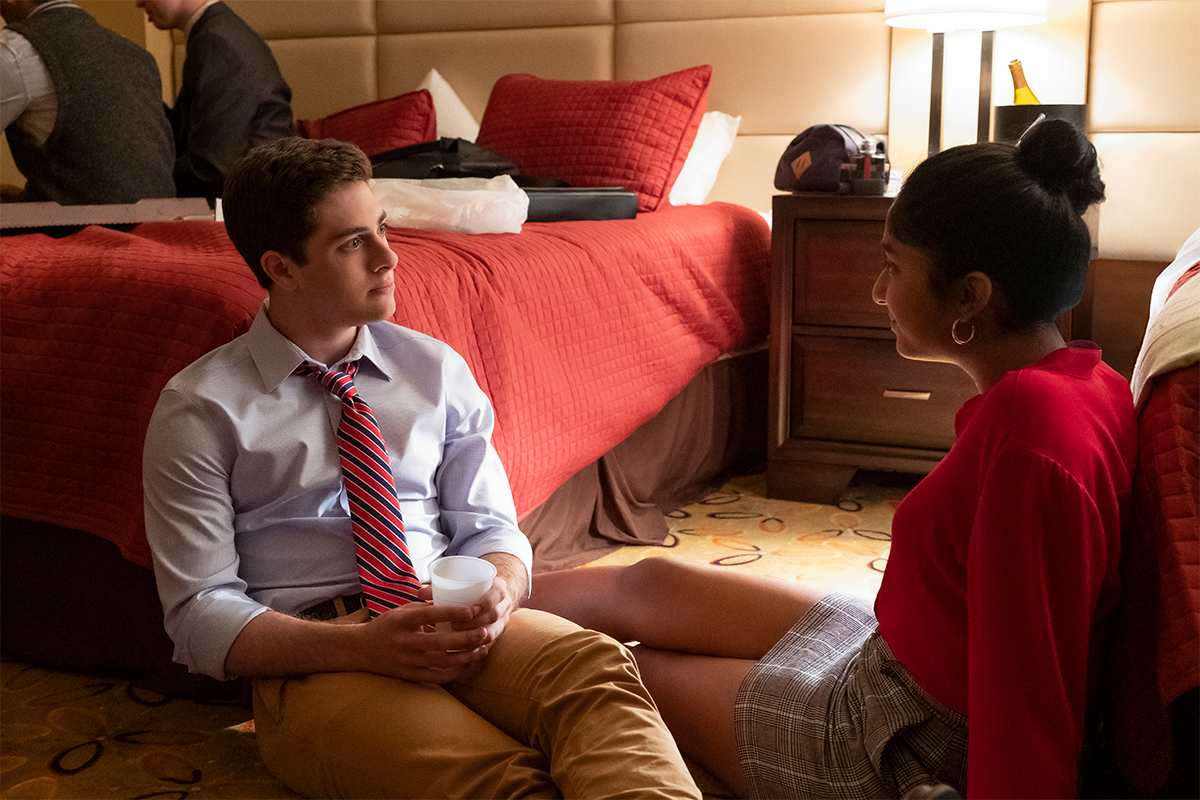
There was also a Jewish love interest, Ben Gross (played by Jaren Lewinson), who was the subject of much discussion here at Alma. Amanda Silberling wrote how the show was full of nuanced diversity — except Ben, the Jewish character, whose Jewishness was the butt of too many jokes. Yet in an interview with Alma, Jaren, a Jewish actor, explained how playing Ben was a dream come true: “I’m very proud of being Jewish and being a part of the Jewish community … You know, when I read the character description, it [said] Ben’s Jewish and had Blake Griffin at his bar mitzvah I was like, oh my God, this is my time, let’s go! It’s great being able to play a Jewish character.”
No matter how you felt about Ben Gross’s Jewish characterization, we are still kvelling over Jaren in his breakout role.
13. Another subject of a lot of “is it good for the Jews?!!” handwringing was Borat Subsequent Moviefilm. Sacha Baron Cohen’s sequel to his beloved satirical hit does an expert job of critiquing antisemitic stereotypes and conspiracy theories while it documents Borat’s adventures in America.
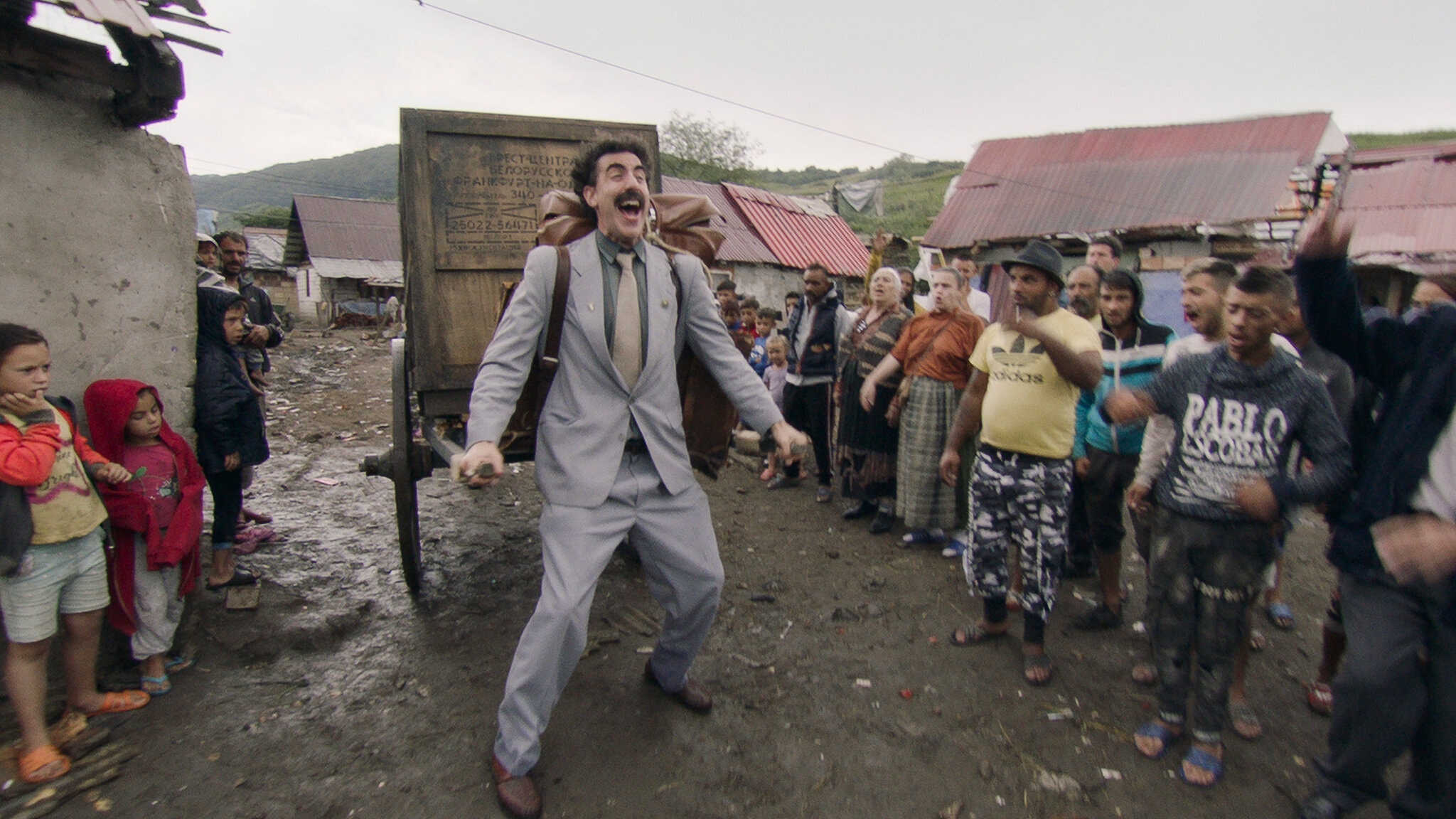
Notably, one scene has Borat interacting with a Holocaust survivor, Judith Dim Evans. Evans’ daughter, Michelle Dim St. Pierre, told Kveller that while her family cares deeply about fighting Holocaust denial, her mother would’ve never agreed to be in a movie that mixes the Holocaust with humor. (Michelle is suing to have her mother removed from the film.) Departing from his usual shtick, Cohen broke character after filming to explain to Evans that he is Jewish. The movie is dedicated in her honor, and Cohen is working to tell Evans’ story. For what it’s worth, Cohen has also been outspoken on the dangers of social media and the spread of Holocaust denial, repeatedly critiquing Mark Zuckerberg and others.
12. In one of the last live performances before Broadway shut down in March, Noah Galvin starred as Joseph in a concert version of Joseph and the Amazing Technicolor Dreamcoat. The Jewish actor said after the performance, “I got to live my gay Jew fantasy tonight in a theater I never thought I’d have the opportunity to perform in. And it was perfect.”
In a pink kippah, jorts, and a rainbow coat (obviously), Galvin was a star. We need the full recording ASAP, Lincoln Center.
11. Daveed Diggs‘ experimental hip-hop group, clipping., released a song on Juneteenth titled “Chapter 319.” Made up of Jewish rapper Diggs and producers Jonathan Snipes and William Hutson, the group released the song after spending weeks protesting with Black Lives Matter.
https://www.youtube.com/watch?v=zkEAOLYasZU
“About a year and a half ago, we met an artist who’d grown up on the Standing Rock reservation. He told us that the media only showed the most horrific parts of the NoDAPL protests—the police’s use of tear gas and sonic weaponry, the mass arrests and harsh treatment of protestors,” they shared in a Twitter thread. “He told us that in between those atrocities, there were many moments of joy. He was there with his whole family—sometimes it was like a huge party. He had brought a PA system to the protest to play music. One of the albums he played was CLPPNG. He said people started requesting ‘Tonight’ because it was fun to dance to and made people laugh. This story got us thinking about music’s usefulness in political and social movements, as a physical, affective expression of collectivity.”
So, clipping. continues, “We made ‘Chapter 319’ as a tribute to S.U.C. member Big Floyd, but also with this specific usefulness in mind. However, if it doesn’t find its way to a protest, at lest [sic] it can be financially useful.” (Proceeds from the track are going to organizations dedicated to racial justice.) As they mention, George Floyd, murdered in Minneapolis, was a member of the Screwed Up Click (S.U.C.) in Houston, where he was known as Big Floyd. “Chapter 319” samples Big Floyd himself.
The whole song is amazing, but TikTok teens picked up on one specific couplet from the pre-chorus: “Donald Trump is a white supremacist, full stop / If you vote for him again you’re a white supremacist, full stop,” making clipping’s music, featuring Floyd, a viral sensation.
10. In more powerful songs, Tair Haim (of the Yemenite sister band A-WA) released her first solo record this year, “Mitbashelet Leat.”
As Hannah Aliza Goldman wrote in Alma, the song is a powerful ode to Mizrahi women. “Tair’s refusal to alter herself into an easily consumable form are echoed in her lyrics. She stubbornly resists any model that is conventional in the music industry. She rejects what her critics want in the lyrics, ‘You wanted me in Hebrew already / But my heart sings in Yemenite.’ Rather than an outright rejection, this refusal is playfully subversive. She sings the song in Hebrew after all, but pronounces the word chamin with the ‘chet’ of a Yemenite accent.”
Watch the amazing music video here:
9. This year, Passover came in the early weeks of the pandemic. As we all figured out how to do a seder on Zoom, a star-studded streaming benefit for the CDC Foundation’s Coronavirus Emergency Response Fund was announced: “Saturday Night Seder.” It starred Jewish celebrities Dan Levy, Ben Platt, Idina Menzel, Jason Alexander, Billy Eichner, Sarah Silverman, Beanie Feldstein, D’arcy Carden, Judith Light, Nick Kroll, Michael Zegen, Harvey Fierstein, Shoshana Bean, Skylar Astin, and so many more, alongside rabbis, various thought leaders, and non-Jewish celebs such as Billy Porter, Josh Groban, Rachel Brosnahan, Darren Criss, Cynthia Erivo, and Tan France.
As I wrote in Alma, “There was something so joyous about watching these Jewish celebrities proclaim their Jewishness loudly and proudly. Watching Dan Levy make a seder plate with famed chef Michael Solomonov’s instructions (for a shank bone, he used a dog treat; for karpas, he used salsa verde), Idina Menzel sing Ma Nishtana, and Richard Kind and Debra Messing tell the Passover story… it was like a balm for my soul. As I sat watching Andy Cohen joke about hiding the afikomen and play up Jewish guilt, Fran Drescher wash her hands while singing The Nanny theme song, Billy Porter belt “Let My People Go,” I couldn’t wipe the smile from my face.”
To put it simply: The Jewish representation in “Saturday Night Seder” was the light we needed in a dark year.
8. Speaking of representation, Emma Seligman’s incredibly Jewy debut film Shiva Baby premiered this year at the Toronto International Film Festival. As Randi Bergman wrote in Alma, “Somewhere between a farce and a coming-of-age tale of young womanhood, Shiva Baby bridges anxiety with comedy — a coping mechanism so inherently Jewish that I can almost picture Moses wisecracking mid-Red Sea parting. And it does it so well — Shiva was a slam dunk with critics upon its release at the Toronto International Film Festival in September.”
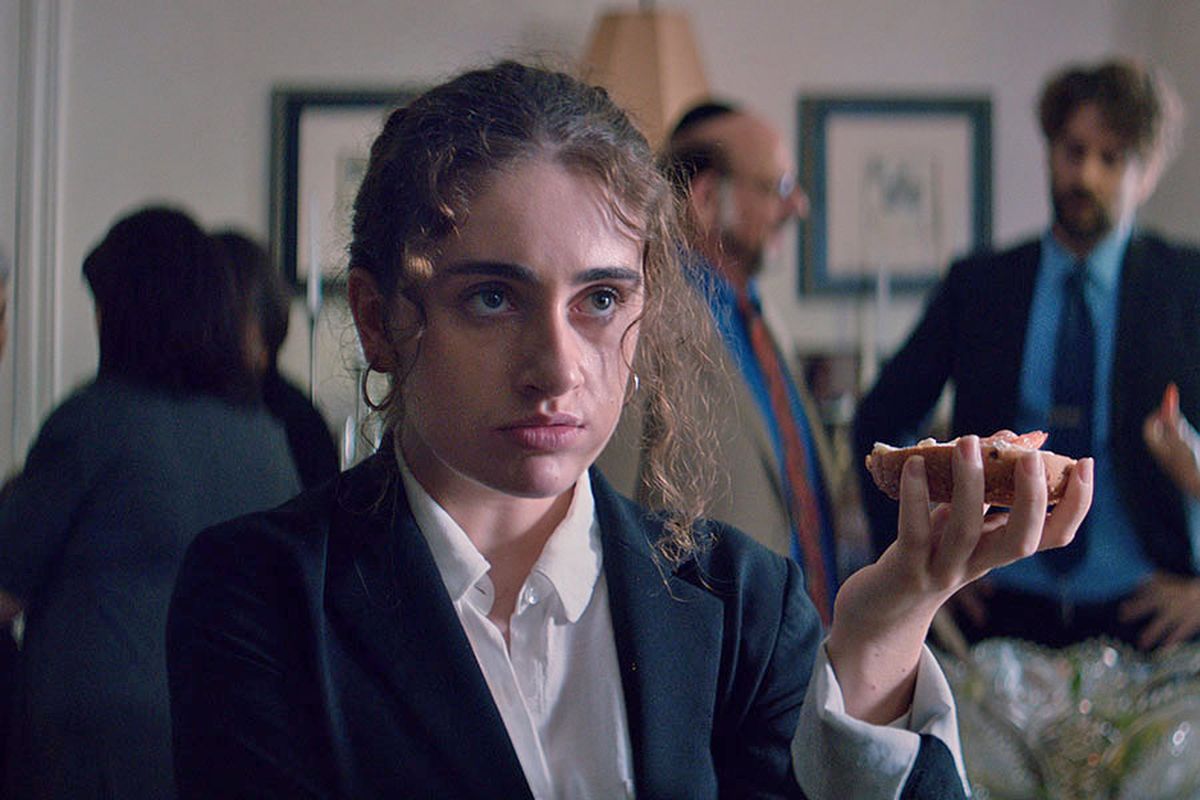
The director, Emma, told Alma, “With making Shiva, which is a movie about Jews and in a Jewish setting, as opposed to a Jewish protagonist in a movie about something else, it felt really important to me to have Jewish people within it.”
7. Another two-parter here, but very related: Our beloved Schitt’s Creek ended this year, and then proceeded to historically sweep the Emmys.
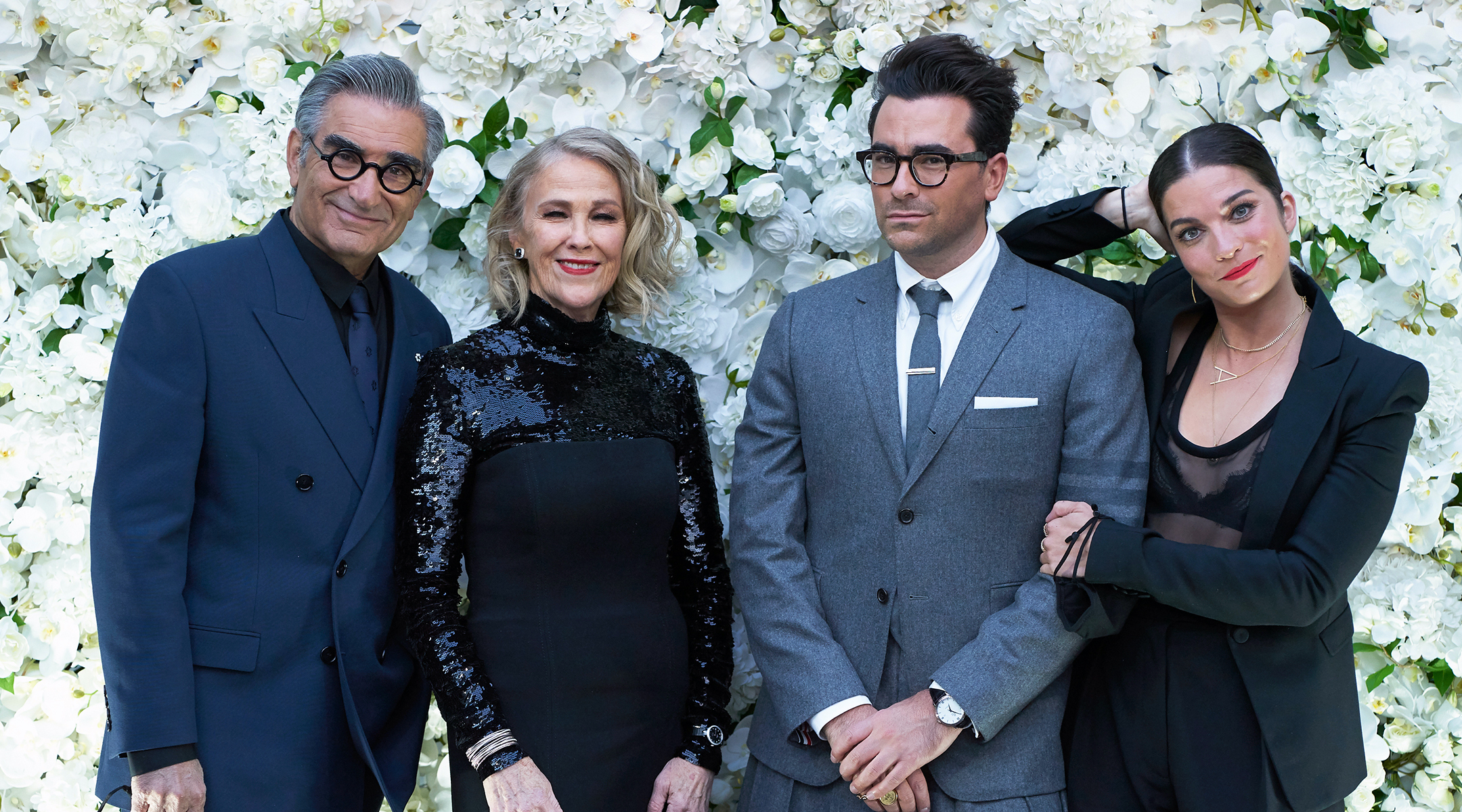
The finale left us with exactly what we were craving so desperately at the moment: a happy ending. There’s so much to love about Schitt’s Creek that we will miss: the way Alexis says “Ew, David!!”; the small references to the Roses’s interfaith identity; Eugene Levy’s eyebrows; Dan Levy’s eyebrows; the romance between Patrick and David; Alexis’s entire character arc; Moira’s wigs; Moria’s voice; anytime Moira is on screen; the Jewish jokes; the way Alexis holds her hands; the “Simply the Best” serenades… I could go on forever.
The beloved series went to win literally every comedy category at the Emmys for its sixth and final season, with Dan Levy alone winning four awards. In his acceptance speech for best comedy series, Dan said, “Our show, at its core, is about the transformational effects of love and acceptance, and that is something we need more of now than we’ve ever needed before.” Amen.
6. There to bring us joy throughout all of 2020 was Mandy Patinkin and his wife, Kathryn Grody, on social media.
As Lior Zaltzman wrote, “Patinkin, the king of Jewish dad energy, his wife, Kathryn Grody, and their son Gideon, are sheltering in place in upstate New York. Their quarantine videos, produced by Gideon, have made me feel seen and soothed. Mandy and Kathryn, who have been together for over four decades and have two sons, Isaac, 37, and Gideon, 33, have taught me more about quarantine relationships than a hundred self-help books ever could. They’ve made me smile so wide that my cheeks hurt. They’ve made me cry real tears. And they’ve shown me, and us, who they are, and why they deserve to be adored.”
Pop culture quiz pt 1 (Dab and Gangnam Style) pic.twitter.com/CvIP4yR9vI
— Mandy Patinkin (@PatinkinMandy) May 18, 2020
The ten favorite snacks in a minute challenge pic.twitter.com/lSYRdgtU0l
— Mandy Patinkin (@PatinkinMandy) December 11, 2020
They’re our new internet parents, and we love them so much.
5. The very, very Jewish Netflix limited series Unorthodox, staring Shira Haas, premiered this year to widespread acclaim. Based on the memoir of the same name by Deborah Feldman, there’s so much to love about Unorthodox — from the talent of Haas, to Amit Rahav’s Yanky, to its use of Yiddish.
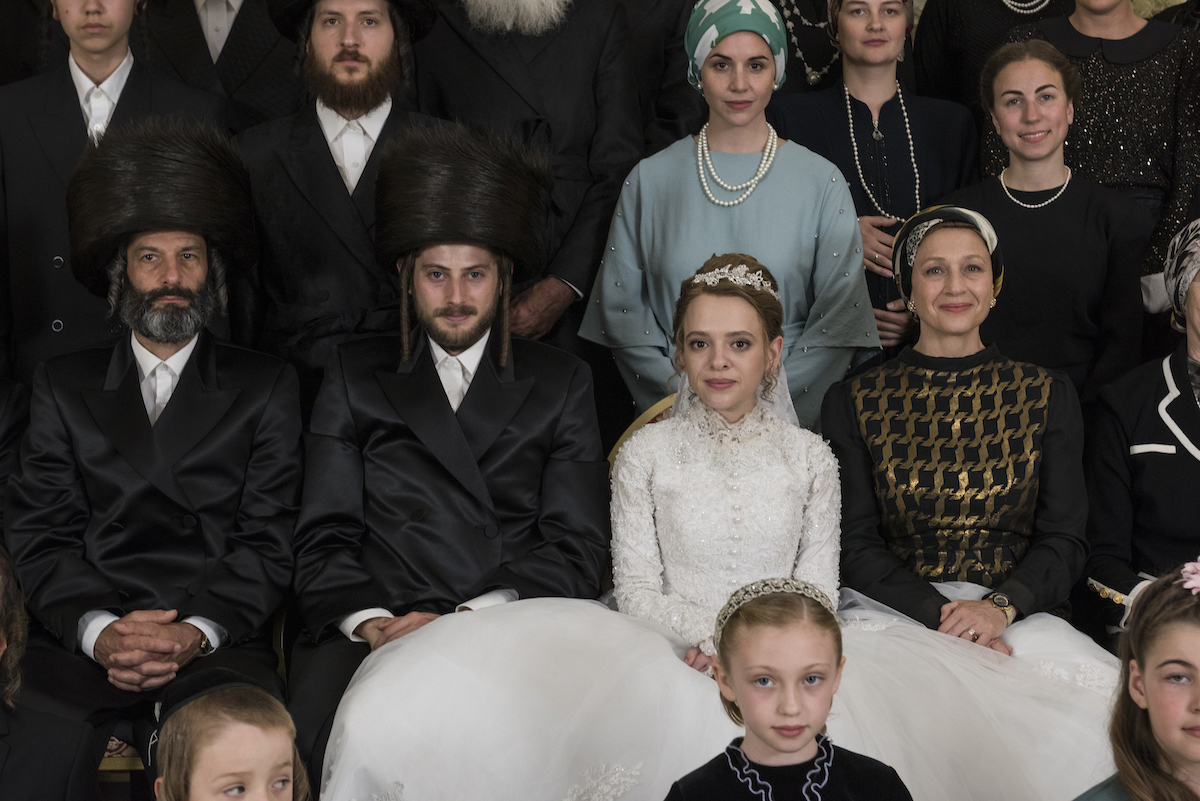
The women-helmed show starring Haas as Esty Shapiro, a woman who leaves her Hasidic community for Berlin, was nominated for eight Emmy Awards. While some have criticized the show for its depiction of Jewish Orthodoxy (or rather, for the effect of said depiction on the perception of Jewish Orthodoxy), this show was truly masterful television, taking care to portray both the Satmar community and the language it speaks with as much precision as possible.
“I think [Unorthodox] is really the first TV series, or at least the first of this magnitude, that really puts Yiddish at its center. And it’s not something to be taken for granted. You know, there are a lot of period shows and Holocaust movies where they don’t speak the language of the place or the people — they speak English. And they could’ve easily done this here. It’s very moving and brave, and I think the world is really thirsty for real and authentic content,” star Shira Haas told Alma.
4. Even though Nissim Black has been active as a rapper since 2006, his February 2020 single “Mothaland Bounce” served as a re-introduction of sorts: He’s Black, Jewish, from Seattle, living in Jerusalem, and “Hitler’s worst nightmare” (arguably the best lyric in the entire song).
Making and releasing “Mothaland Bounce” was a big risk for Black, whose music in the last decade has been aimed at a primarily Jewish audience. “I’m very shocked at how much this song has been shared, how well received it was,” Black told Alma in February. “In terms of the Jewish world, it was a big risk; a lot of them are religious.” Black was worried they wouldn’t understand a song where the influences are very clearly Black culture and Black history. Yet, the risk was worth it, cementing Black as a force to be reckoned with as a Jewish rapper.
The music video pays homage to Black’s past and present, and the visuals are inspired by one of his favorite films, Coming to America:
As he explained to Alma, “The African dancers represent the slaves that came here to America, which is our past. And then, you have the street dancers, the urban aspect.” The video depicts these two groups as facing off against each other, representing Black “trying to figure out what I was.” But then, lastly, Hasidic dancers show up near the end. “What brought peace for me was Judaism,” Black explains, “so the Hasidic guy, he comes to break up the two things, and he brings shalom. It was all very telling of who I was.”
3. Jewish sisters Este, Danielle, and Alana, who make up the band Haim, released their third album, Women in Music Pt. III, to critical praise this year. They were set to embark on a deli tour (!) to promote it (which, you guessed it, was cancelled by the pandemic). Still, the sisters used their platform to speak about Black Lives Matter, teach Zoom dance classes, and dish about their bat mitzvahs. Women in Music Pt. III is a perfect album: moody, personal, and atmospheric. From the opening saxophone on the first track “Los Angeles” to the guitars on the last track “FUBT,” each song is meticulously crafted and wraps you up in emotion while making you feel less alone.
Haim was nominated for Grammys for album of the year and for best rock performance for their song “The Steps” (in a first ever all-women category for best rock performance!).
As Sophie Levitt wrote in Alma, Haim led the way for Jewish women in 2020. We just adore them.
2. You didn’t think Taika Waititi would only get one moment on this list, did you? At the 2020 Oscars, Waititi, who directed, wrote, and starred in Jojo Rabbit, won an Oscar for Best Adapted Screenplay, cementing him as the first Indigenous director to win at the Oscars. (And the first Indigenous Jewish man, at that!) His Jewish mom, Robin Cohen, was the one who gave him the book Caging Skies by Christine Leunens, which Jojo Rabbit is based on, encouraging him to adapt it into a movie. What resulted was an “anti-hate” satire featuring a young boy’s imaginary friend, Hitler, and a powerful commentary on how hate is taught.
During his acceptance speech, Waititi dedicated his award to “all the Indigenous kids in the world who want to do art and dance and write stories. We are the original storytellers and we can make it here as well.” He ended his speech by saying, “Thank you, kia ora,” a Māori phrase that means “be safe.”
Also, Jewish actress Natalie Portman and Jewish actor Timothée Chalamet presented Taika Waititi with his Oscar, and then proceeded to take a million amazing photos in the press room together. (Waititi is set to direct Natalie as Thor in Thor: Love & Thunder, coming out next year.)
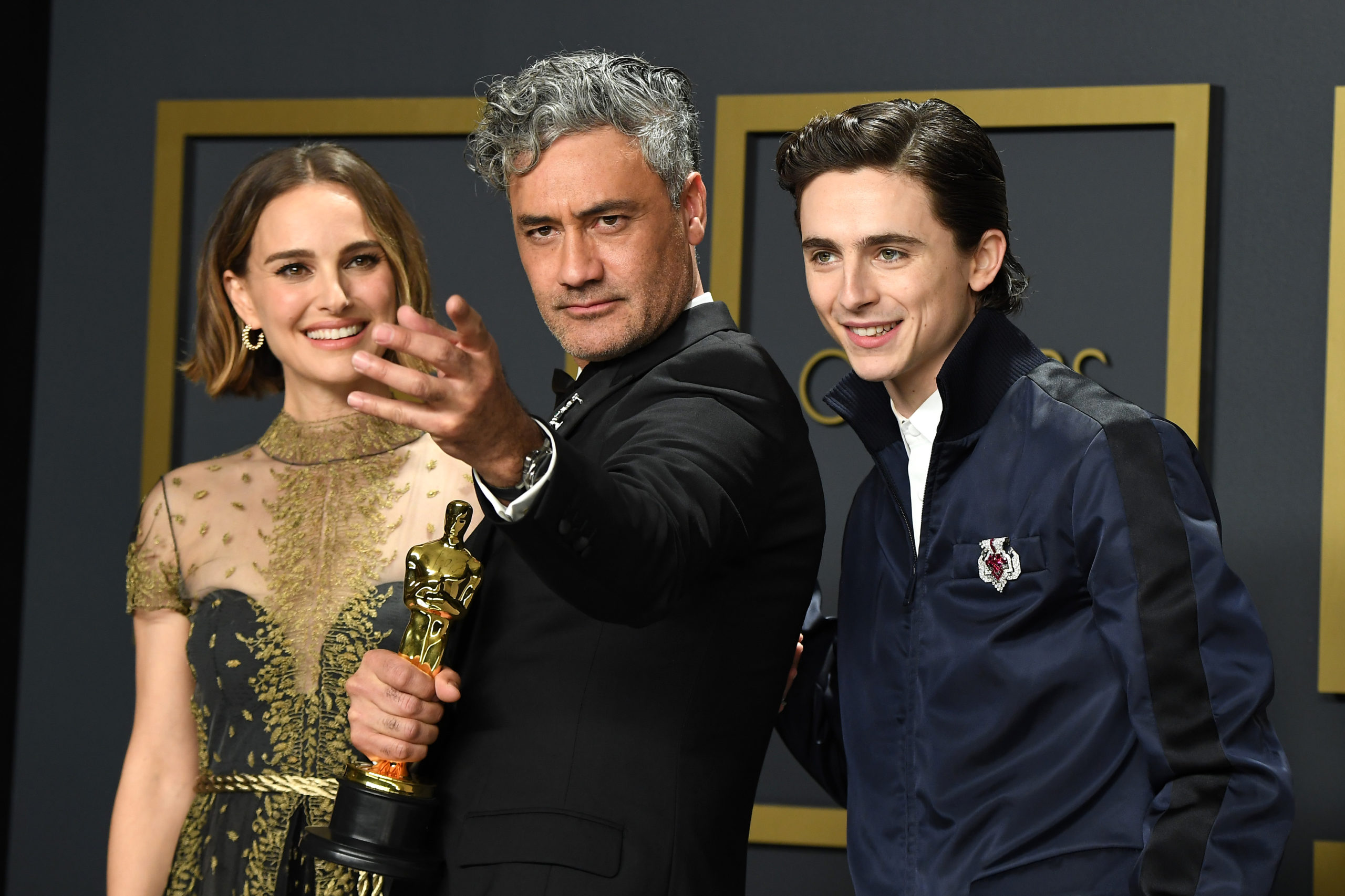
Later in the ceremony, Waititi made history again in a quick moment halfway through the ceremony when he shared a land acknowledgement: “The Academy would like to acknowledge that tonight we have gathered on the ancestral lands of the Tongva, the Tataviam, and the Chumash. We acknowledge them as the first peoples of this land on which the motion pictures community lives and works.”
1. And that brings us to our #1 Jewish pop culture moment of 2020, which goes to… drumroll please… Daveed Diggs’ Hanukkah song, “Puppy for Hanukkah.”
Over a traditional sounding Jew-y melody accompanied by a clarinet, tsimbl, and percussion, Diggs takes us through all eight nights of anticipating a puppy, with the chorus of: “You know what I wanta / I want a puppy for Hanukkah / And Imma get just what I wanted, yep / Imma get a puppy for Hanukkah.”
It’s a certified bop:
Beyond the catchiness of the song, it’s an amazing — and authentic! — example of Black Jewish representation. As Jesi Taylor Cruz wrote in Alma, “It’s just nice to feel seen without being tokenized, fetishized, or having the experiences of Black Jews written by white, non-Jews who happen to be in the writers room or showcased for the sake of representation alone. I may not get a puppy for Hanukkah, but at least I now have a Hanukkah rap that just feels right.”
Diggs himself spoke about this with NPR, saying:
When we first talked about it, what I was sort of really clear on was that I didn’t want it to feel… there’s a thing that happened to me a lot growing up where, in some ways, I felt very embraced by the Jewish community when I was rapping or when I was doing something cool. But there was a kind of tokenism there. Like, I didn’t really feel like it much involved me, you know, when I was getting pulled over by the cops or whatever.
What I really like about how this came out is that it is not – there’s no comment on it at all. These are just kids trying to get a puppy (laughter). And they also happen to be Jewish, you know? But what I like about how the song came out is that the way that Judaism is practiced in there. I barely remember when Hanukkah is coming around — or any of the holidays, for that matter. But that’s part of being Jewish, too. So I love the lines, like, not sure what it means, but I learned it phonetic. Like, that’s very real for a lot of us, you know? (laughter) And to be able to express things like that and be of color and still be able to be recognized as being Jewish — that’s sort of the whole package to me.
Daveed Digg’s “Puppy for Hanukkah” is the whole package for us, and without a doubt the best moment of the year. So thank you, thank you, thank you.
Now it’s your turn to bring the goods, 2021.
